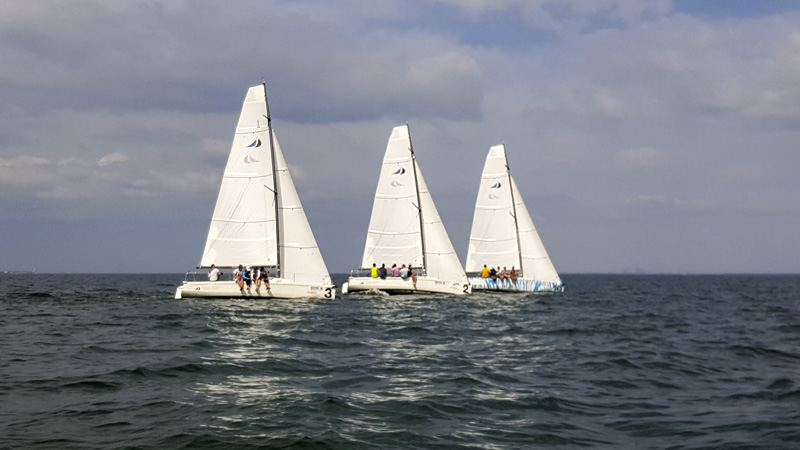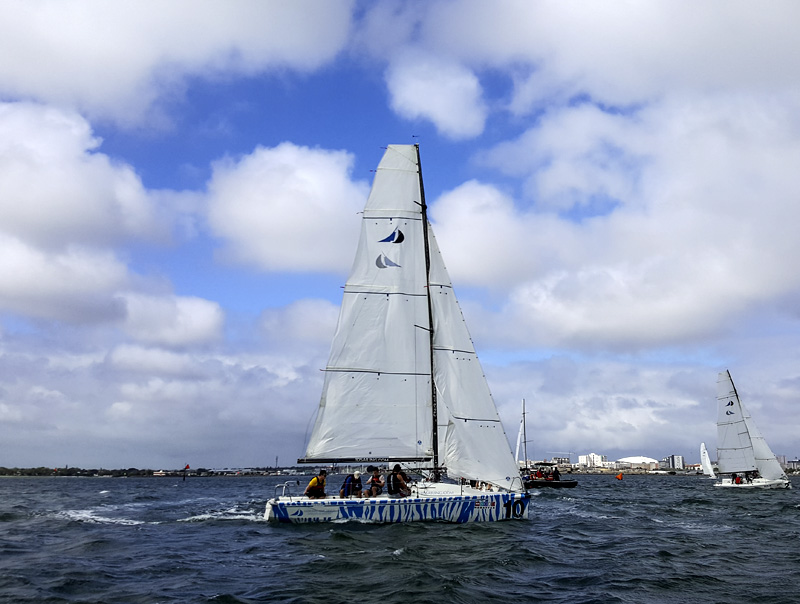By: OCdt Tristan Thomson, RMC Yacht Club Commodore
The Royal Military College of Canada (RMC) Keelboat Sailing team earned a podium finish at the first ever Canadian Intercollegiate Sailing Association (CICSA) mid-winter training clinic and regatta, held in St. Petersburg, Florida, February 20-24, 2017.
The clinic was instructed by Canadian Olympian and sailing hall of famer Andreas Josenhans, using Flying Tiger 7.5 meter keelboats. A key element of the Flying Tiger is the asymmetrical spinnaker, which requires different skill sets than the symmetrical spinnaker design of RMC’s J/24 keelboats.
Training on this class of vessel is critical for the team’s development and success, since it is this style of keelboat that is used at the Student Yachting World Cup and the CISM World Games, both goals the sailing team has been enthusiastically working toward.

The five Cadet team representing RMC joined students from the University of Ottawa, Concordia University, Dalhousie University and host, University of South Florida.
Throughout the two-day clinic, Josenhans led discussions on various topics such as meteorology, upwind versus downwind speed techniques, various starting procedures, asymmetrical spinnaker handling, optimal sail physics, and advanced racing tactics. After each lesson, theory was applied on the water and captured on video to revisit during the debrief. Together, they analyzed boat positioning, adjustment of sails based on wind characteristics, and areas for tactical and strategic improvement in each scenario. Everyone was in agreement that the two days spent with world class coach Josenhans was invaluable for developing their proficiency as competitive sailors.
The remaining three days was an opportunity for the teams to apply their new knowledge and formulate strategy against each other under the intensity of racing conditions. Although the first day started with disappointment due to a thunderstorm in the forecast, the teams used the morning to examine procedures for heavy wind sailing and emergency evolutions, as well as refresher lessons from the previous days. The afternoon off the water granted the students an opportunity to visit some of the local sights in St. Petersburg.

The weather conditions on Thursday were a sailor’s delight with sunny skies, winds of 8-12 knots, and a high of 25 C. The RMC team led the regatta off strong with an extremely close 2nd place finish for the first race. They were consistently first off the dock, every professional racer’s objective for extra practice prior to the start of race, and continued to be strong contenders throughout the day against all rivals.
Overall, it was an excellent week for a crew that had never sailed together on asymmetrical keelboats. Throughout the week the team continued to improve, and after seven races completed over three days, RMC’s third place finish represents the best result at a CICSA event. The substantial amount of skills and knowledge gained has helped position the RMC keelboat team for championship placements next season and has also sharpened their focus towards becoming qualifiers for CISM World Games.
The team would like to thank the following key players for supporting this cadet funded event: coach MCpl Todd Ward, the impetus behind this pilot project; team manager Lt(N) Jennifer Fidler, who endeavoured to minimize costs through sponsorship efforts and logistical coordination; and PSP Athletics, for their ongoing support.